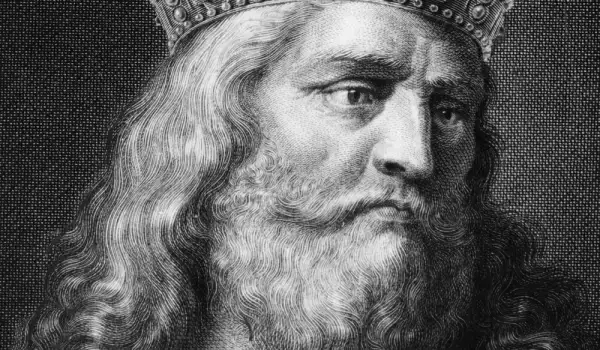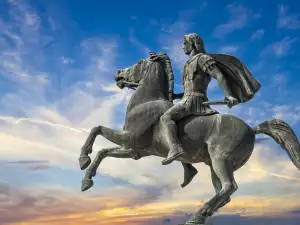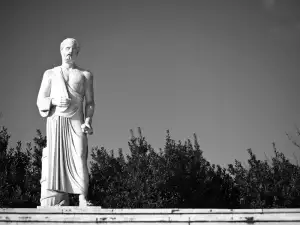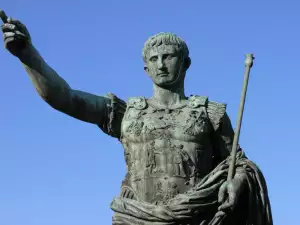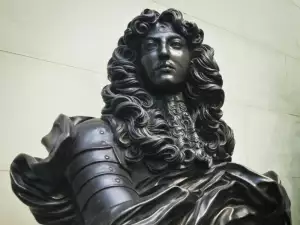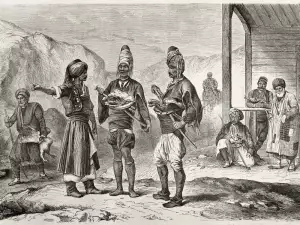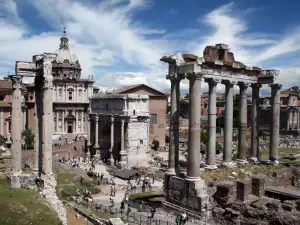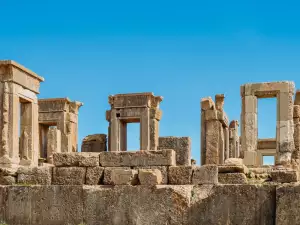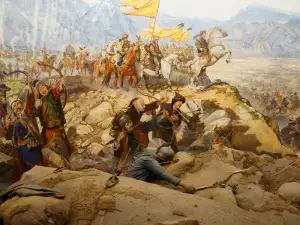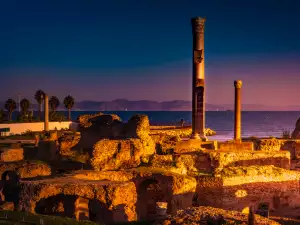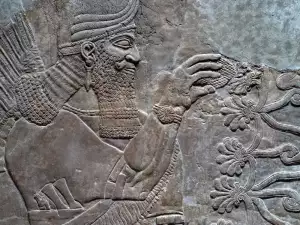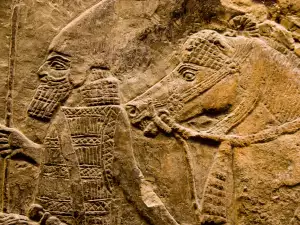Charlemagne was born on April 2, 747. He was the greatest king of the Franks. He manages to create a state unprecedented in size and power since the time of the Roman Empire, which had collapsed three centuries earlier. He united under his authority the greater part of Western Europe, being declared emperor of the Romans, laying the foundations of the powerful state union that determined the destinies of the West in the following centuries - the Holy Roman Empire.
At the time of the birth of Charlemagne, his father Pippin III was the governor of the palace of the rulers of the Franks - the Merovingian family. In fact, he wielded effective power over the vast Frankish kingdom.
Little is known about the youth of Charlemagne. He received practical leadership training by participating in the political, social and military activities associated with his father's court. His early years were marked by a series of events which had enormous implications for his future development and the fate of the Franks.
In 751, with papal approval, Pippin seized the Frankish throne from the last Merovingian king, Chilederic III. After his meeting with Pope Stephen II at the royal palace of Pontion in 753–754, Pippin forged an alliance with the pope, pledging to defend ancient Rome in exchange for papal authorization of the Pippin dynasty's right to the Frankish throne.
Pippin invaded Italy in 755 and 756 to contain the threats from the powerful Lombard kingdom against Rome. After the victories, he donated all the lands in central Italy to the Pope and this gave rise to the Papal State (Vatican), which existed in this form until 1870.
After Pipin's death in 768, his kingdom was divided according to Frankish custom between Charlemagne and his brother Carloman. Almost immediately, the rivalry between the two threatened the unity of the Frankish state. Seeking an advantage over his brother, Charlemagne allied himself with Desiderius, king of the Lombards.
Charlemagne marries his daughter in order for Desiderius to sign an agreement that threatens the delicate balance established in Italy by Pippin's alliance with the papacy. Carloman's death in 771 ended the growing crisis and Charlemagne, disregarding the rights of Carloman's heirs, assumed control of the entire Frankish kingdom.
Charlemagne takes power at a time when powerful forces of change are affecting his dominions. By Frankish tradition he is a warrior king. They expect him to wage wars that expand Frankish hegemony and the wealth of the aristocracy. His Merovingian predecessors had greatly expanded the power and territory of the Frankish state and left him a vast state ruled by many different people. This makes the unity of the country difficult and almost impossible.
The insatiable appetite of the Frankish aristocracy for wealth and power, as well as the constant division of the Frankish kingdom, resulting from the custom of treating it as an inheritance to be divided among all male heirs, made governance extremely difficult.
Charlemagne, who is considered the founder of the Carolingian dynasty, began a series of reforms aimed at reducing the strong power in the hands of the aristocracy, making the administration of the ever-growing population of the state easier and to end the growing fragmentation of the country.
The hallmark of Charlemagne's reign was his efforts to respect the age-old customs and expectations of Frankish society while creatively responding to new forces affecting society. His personal qualities serve him well in meeting this challenge. He is the ideal military leader, an imposing physical presence blessed with extraordinary energy, personal courage and an iron will. He loves an active life - military campaigns, hunting, swimming, but he also spends enough time at the royal court, where he lavishly distributes gifts and creates strong friendships.
He is also extremely active in another field. He has five wives and at least 18 children, some by concubines, others by his legal wives.
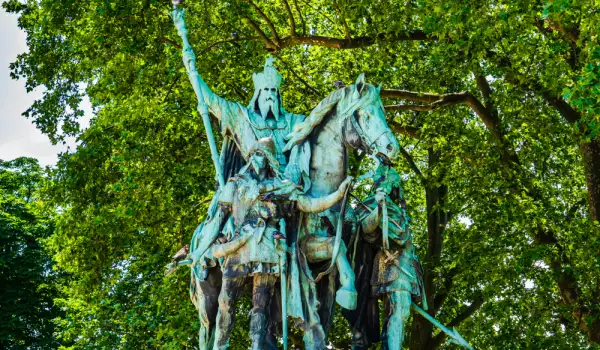
Although he received only a rudimentary level of formal education, Charlemagne possessed a considerable intellect, a keen curiosity and a willingness to learn from others. These aspects of his personality, combined with his respectable, loyal and lovable persona, make him a leader capable of making informed decisions, being willing to act on them and being able to persuade others to follow him.
The eighth century placed Europe in an entirely new political situation. The Slavs settled more and more lands in the east. The Avars in central Europe threatened the hegemony of the Franks in Italy and the Arabs, who had settled permanently in Spain, threatened its southern provinces.
With his accession to the throne, Charlemagne was called to the aid of the Pope, who demanded assistance against Lombardy. Charlemagne's troops invaded through the Alps and after a series of heavy and battles bring the Lombards to their knees. Charlemagne goes to Rome and reaffirms his father's alliance with the Pope. He then renewed the wars with the Lombards, by crushing them completely. He declared himself king of Lombardy and included in his dominions all of northern and central Italy.
In 787, he renewed his Italian campaign, invading southern Italy and defeating the last Lombard rulers, stubbornly guarding their independence. In addition to Gaul (today's France), all of Italy was included under his reign.
Between 772 and 802, Charlemagne began a series of campaigns against the empire's northeastern neighbors-the powerful kingdom of Saxony, the last remaining unconverted German state.
The Saxons proved to be a tough opponent. With little interruptions, the wars continued for almost 30 years. It took more than 19 military campaigns to subdue the last German pagans and convert them to Catholicism. Charles included all of Germany in his dominions.
Several campaigns in the south followed, the great general defeating the Moors, including Navarre, Barcelona and the region of Waksonia in his dominions.
In 800, Charlemagne rescued Pope Leo III from severe political difficulties in Rome (Leo was attacked by relatives of the former pope and accused of various crimes). On Christmas Day of that year, Charlemagne was crowned Emperor of the Romans by Leo and became known as Charlemagne - Ruler of the Holy Roman Empire. This event was met extremely hard by the other most powerful state in Europe - the Byzantine Empire, which is considered the sole heir of Rome.
The Holy Roman Empire itself survived even after the collapse of the Frankish state. Its end was brought about by another great general born in France - Napoleon Bonaparte, a thousand years later - in 1806.
Charlemagne's last campaigns turned eastward. His armies invaded Pannonia, crushing the powerful Avar Haganate – one of the last great steppe empires in Europe. It is divided between the Frankish Empire and the Bulgarian Empire of Khan Krum, who attacks the Haganah from the east.
Two campaigns against the southern and western Slavs followed. The lands of the empire briefly included the lands of the Croats in the south and the Obotrites in the north.
The Frankish Empire did not survive after the death of Charlemagne. The emperor died in 814 at the age of 71. The country was divided into three between his successors - the Frankish Kingdom, which later became France, the East Frankish Kingdom, which became Germany and the Italian Kingdom, which did not survive long and this title ceased to be used in the 10th century until 1871, when a united Italy was created.
The Carolingian dynasty disappeared in Germany in 911 and several Saxon dynasties rose in its place. In France, the dynasty survived until 952, when it was succeeded by the Capetian dynasty.
This ended Carolingian rule over Western Europe. However, the memory of them remains long after their last representatives die.
Almost every Western European ruler during the Middle Ages and after, tried to approach at least a little bit the greatness of Charlemagne, but very few succeeded.
Although short-lived, Charlemagne's empire marked the beginning of Western European civilization and the rapid development and hegemony of Catholicism in the following centuries.
